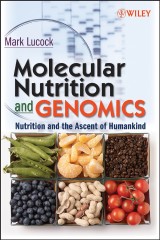Details

Molecular Nutrition and Genomics
Nutrition and the Ascent of Humankind1. Aufl.
|
111,99 € |
|
| Verlag: | Wiley |
| Format: | |
| Veröffentl.: | 16.07.2007 |
| ISBN/EAN: | 9780470129371 |
| Sprache: | englisch |
| Anzahl Seiten: | 152 |
DRM-geschütztes eBook, Sie benötigen z.B. Adobe Digital Editions und eine Adobe ID zum Lesen.
Beschreibungen
This fascinating book draws it subject matter from a range of relevant disciplines that extend from molecular nutrition, nutritional sciences, and nutrition dietetics through to genetics, genomics, and anthropology. It presents a vital portrait of the absolutely fundamental role that nutrition has played and continues to play in shaping who and what human beings are, as well as where they evolved from, and where they may be heading as a species. <p><b><i>Molecular Nutrition: Nutrition and the Evolution of Humankind</i></b>:</p> <ul> <li>Blends coverage of the molecular mechanisms that underpin nutrient-gene interactions with evolutionary theory</li> <li>Takes a molecular biological approach to problem solving, and moves nutrition away from its dietetic and anthropological origins to the front lines of genomic research</li> <li>Covers key concepts in molecular biology; the –omics revolution and bioinformatics; recent human evolution; molecular mechanisms of gene-nutrient interactions; the importance of nutrients and genomics in disease; the evolution of micronutrient metabolism, protein structure, and human disease; nutrients and the human lifecycle; contemporary dietary patterns; leading-edge laboratory tools in nutrigenomics and human evolutionary studies</li> </ul> Written by an internationally recognised expert in the field, <b><i>Molecular Nutrition: Nutrition and the Evolution of Humankind</i></b> is an invaluable text and reference book for a wide range of teachers, students, and researchers.
<b>PREFACE.</b> <p><b>ACKNOWLEDGMENTS.</b></p> <p><b>INTRODUCTION.</b></p> <p><b>Chapter 1—Defining Important Concepts.</b></p> <p>1.1 Key Concepts in Molecular Biology for the Study of Human Nutrition.</p> <p>1.2 The Inheritance of Genetic Packets of Information.</p> <p>1.3 A Brief Overview of Evolutionary Biology and the Ascent of Man.</p> <p>1.4 The –<i>omics</i> Revolution.</p> <p><b>Chapter 2—Molecular Mechanisms of Genetic Variation Linked to Diet.</b></p> <p>2.1 A Brief History of the Human Diet.</p> <p>2.2 The Role of Milk in Human Evolution.</p> <p>2.3 Micronutrients and the Evolution of Skin Pigmentation.</p> <p>2.4 Micronutrients Optimize Gametogenesis and Reproductive Fecundity.</p> <p>2.5 Direct Dietary Selection of a Human Metabolomic Profile.</p> <p>2.6 The Evolution of Taste as a Survival Mechanism.</p> <p>2.7 The Mystery of Alcohol Dehydrogenase Polymorphisms and Ethanol Toxicity.</p> <p>2.8 Evolution of Xenobiotic Metabolism in Humans.</p> <p><b>Chapter 3—Essential Nutrients and Genomic Integrity: Developmental and Degenerative Correlates.</b></p> <p>3.1 Micronutrients and Genomic Stability and Function.</p> <p><b>Chapter 4—Nutrients and Cerebral Function in Human Evolution.</b></p> <p>4.1 Human Encephalisation May be Linked to an Evolutionary Reduction in Gut Mass.</p> <p>4.2 Weaning and Brain Development.</p> <p>4.3 Micronutrients and the Cerebral Basis of Spirituality and Social Structure.</p> <p>4.4 Pharmacotoxicology of Plants and Cultural Evolution.</p> <p><b>Chapter 5—The Evolution of Micronutrient Metabolism.</b></p> <p>5.1 Antioxidants, Evolution, and Human Health.</p> <p><b>Chapter 6—Evolved Refinement of the Human Lifecycle Based on Nutritional Criteria.</b></p> <p>6.1 Human Breast Milk—An Evolved Food.</p> <p>6.2 Conflict between Parent and Offspring over Nutrient Requirements.</p> <p>6.3 Natural Selection for Foraging Efficiency.</p> <p>6.4 Evolution of Senescence.</p> <p><b>Chapter 7—The Evolution of Human Disease.</b></p> <p>7.1 The Conflict between Agriculture and Ancestral Genes.</p> <p>7.2 Obesity: A Chronic Plague of our Affluent Societies.</p> <p>7.3 Prion Protein Locus and Human Evolution: The Link Between Variant Creutzfeld-Jakob Disease and Cannibalism.</p> <p><b>Chapter 8—Contemporary Dietary Patterns that Work: The Mediterranean Diet.</b></p> <p>8.1 Tomatoes.</p> <p>8.2 Olive Oil.</p> <p>8.3 Red Wine.</p> <p>8.4 Bioflavonoids.</p> <p>8.5 Fish.</p> <p><b>Chapter 9—Some Non-Micronutrient Essential and Nonessential Nutrients with Molecular and Possible Evolutionary Impact.</b></p> <p>9.1 Lecithins.</p> <p>9.2 Lipid-Derived First Messengers—The Eicosanoids.1</p> <p>9.3 Isoflavones—Genomic and Nongenomic Influence at the Estrogen Receptor.</p> <p>9.4 Phytic Acid.</p> <p><b>Chapter 10—Natural Food Toxins and the Human Diet.</b></p> <p>10.1 Dietary Zootoxins.</p> <p>10.2 Dietary Phytotoxins.</p> <p><b>Chapter 11—Nutrigenomics.</b></p> <p>11.1 What is Nutrigenomics?</p> <p>11.2 Genetic Buffering Underpins Nutrigenomic Relationships.</p> <p><b>Chapter 12—The Evolution of Protein Function.</b></p> <p><b>Chapter 13—Leading Edge Laboratory Tools in Nutrigenomics and Human Evolutionary Studies.</b></p> <p>13.1 Denaturing HPLC.</p> <p>13.2 DNA Sequencing.</p> <p>13.3 Nucleic Acid Microchip Techniques.</p> <p>13.4 The Polymerase Chain Reaction.</p> <p>13.5 Protein Mass Spectrometry.</p> <p>13.6 Bioinformatics.</p> <p><b>References.</b></p> <p><b>Index.</b></p>
<b>Mark Lucock</b>, PhD, is a Senior Lecturer in Human Molecular Nutrition at the University of Newcastle School of Environmental and Life Sciences, New South Wales, Australia. Dr. Lucock is internationally recognized as a pioneer in the field of human nutrition, nutrition and genomics, and nutrition and evolution.
<b>Learn how nutrition has driven—and continues to drive—human evolution</b> <p>This pioneering text draws from molecular nutrition, nutritional sciences, dietetics, genetics, genomics, and anthropology to examine how chemical nutrients and genetics shape the human species. It presents a vital portrait of the fundamental role that nutrition has played and continues to play in shaping who and what human beings are, where we evolved from, and where we might be headed as a species.</p> <p>The author's innovative molecular biological approach moves the field of nutrition well beyond its traditional dietetic and anthropological origins to the front lines of genomic research. Following a presentation of molecular biology concepts that are essential for the study of human nutrition, the author explores such key topics as:</p> <ul> <li> <p>Bioinformatics and the -omics revolution</p> </li> <li> <p>Recent human evolution</p> </li> <li> <p>Molecular mechanisms of gene-nutrient interactions</p> </li> <li> <p>Role of nutrients and genomics in disease</p> </li> <li> <p>Evolution of micronutrient metabolism, protein structure, and human disease</p> </li> <li> <p>Nutrients and the human life cycle</p> </li> <li> <p>Mismatch of contemporary dietary patterns and our genetic makeup</p> </li> <li> <p>Laboratory tools for nutrigenomics and human evolutionary studies</p> </li> </ul> <p>Figures and illustrations provided throughout the text help readers grasp and visualize complex concepts and processes with ease. For readers interested in pursuing particular topics in greater depth, an extensive list of current references is provided.</p> <p>This text is ideal for undergraduate and graduate students in human nutrition, dietetics, metabolism, molecular biology, and many other allied health sciences. Nowhere else can readers find such an integrated blend of medical, nutritional, and biochemical disciplines to aid in understanding the role of nutrients in human evolution.</p>


















